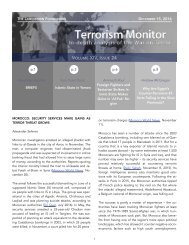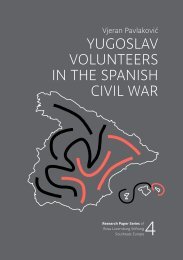SUMMARY
2016_classification_of_programmes_against_violent_islamist_extremism.pdf?utm_content=buffer41973&utm_medium=social&utm_source=twitter
2016_classification_of_programmes_against_violent_islamist_extremism.pdf?utm_content=buffer41973&utm_medium=social&utm_source=twitter
You also want an ePaper? Increase the reach of your titles
YUMPU automatically turns print PDFs into web optimized ePapers that Google loves.
Policy should and can create the framework for effective prevention/intervention<br />
work. This must be done not only in the form of<br />
financial and structural support, but also by policy that embraces<br />
preventative/intervening measures (see Dantschke 2015, 944-<br />
948).<br />
By and large, the examination and prevention of Islamist radicalisation<br />
is still a new area of investigation in Germany (see Ceylan/Kiefer<br />
2013; Zick/Böckler 2015). To date, no strategy has been<br />
implemented at national level for radicalisation prevention/intervention.<br />
The reasons for this are thought to be insufficient<br />
knowledge in the area of radicalisation research and the lack<br />
of exchange between the existing initiatives (see Ceylan/Kiefer<br />
2013).<br />
National programmes, such as those already exiting in the UK,<br />
Denmark or France, differ in many respects “[...] [but] all the experiences<br />
are deeply shaped by political, cultural and legal elements<br />
of the country [...]” (Vidino 2013). A recourse to already existing<br />
experiences with regard to prevention/intervention of any<br />
tendencies towards (Islamist) radicalisation is therefore also possible<br />
in the case of the Federal Republic of Germany, since various<br />
initiatives have already been launched. For example, the experiences<br />
from radicalisation prevention/intervention among rightwing<br />
extremists are being drawn upon, along with pedagogic concepts<br />
for the development of skills.<br />
Apart from the question of the central criteria and priorities of<br />
state-based action plans, there is also the question of the significance<br />
and relevance of state institutions and research as actors in<br />
the area of radicalisation prevention. This question, among others,<br />
was addressed within the framework of the 19th German Prevention<br />
Day 2014. Three central requirements for all three actors<br />
were proposed and outlined as a critical factor in the interrelationship<br />
between the state, research and practice (see Marks<br />
2014):<br />
1. Interdisciplinarity: Ensures coordinated cooperation between<br />
representatives/authorities from different areas.<br />
2. Competence: Definition of the respective tasks/profiles and<br />
responsibilities.<br />
27








